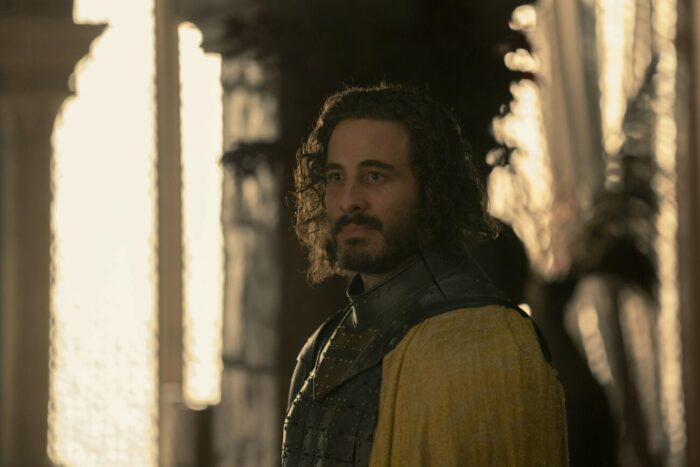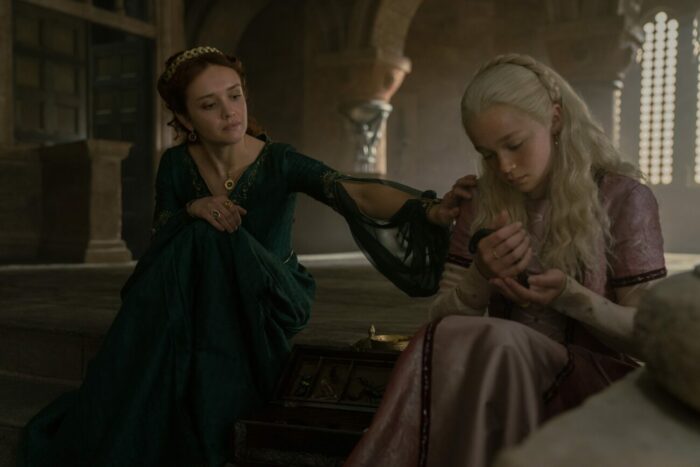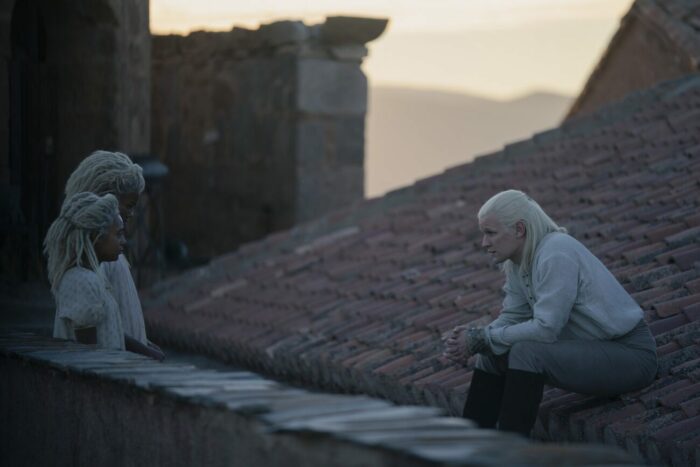The following contains spoilers for House of the Dragon S1E6, “The Princess and the Queen” (written by Sara Hess and directed by Miguel Sapochnik)
I’ll just come right out and say it: this week’s episode of House of the Dragon is not only one of the worst episodes of television I’ve seen in recent memory, it has almost singlehandedly killed pretty much whatever enthusiasm or interest I might have had in the show going forward.
This week’s episode was the big time skip of the season that we had been anticipating from the beginning, but instead of a logical progression that maintains the momentum slowly being built up from previous episodes, we instead get what is functionally a second pilot. Everything comes grinding to a screeching halt so we can get introduced to a cast of brand new characters, along with characters that might as well be new ones given how different they feel from who they were even in last week’s episode.
Remember Ser Harwin Strong? I had to look him up in the wiki—turns out, he was the knight who mistook Rhaenyra for a boy during her late-night adventure with Daemon! Who knew? Well, it turns out that at some point during the ten years they don’t just meet up, he winds up fathering all three of her children. How did this happen? How did they meet? We don’t know! One would think that there would be some sort of buildup from him being a random member of the City Watch to the father of the princess’s children, but apparently development is for silly people and not of any real importance. And besides he’s dead before the episode is over, so it’s not like he was a character of any real importance for any real length of time.

It’s not just whole relationships seemingly conjured out of thin air, but entire families as well. “The Princess and the Queen” introduces a stunning eight different children of the main characters: Daemon and Laena are now married, with two daughters and a third on the way; Rhaenyra and Laenor have three, and Viserys and Alicent now have a third to go along with the two we’ve already met.
Several of these children are the focus of a fair amount of screen time, and I don’t really care about any of them! The only one with any semblance of a personality is Aegon, who comes across as a poor man’s Joffrey—the sadistic boy king from early Game of Thrones, not Rhaenyra’s newborn son who Laenor named after his dead lover Joffrey, which does not seem to be a healthy coping mechanism—while the rest of them just come across as a bunch of bratty kids who don’t like each other because their mothers don’t like each other. They’re really just there to underscore how bad things have gotten between Alicent and Rhaenyra, a relationship which the show is increasingly piling all of its emotional weight onto making sure you’re invested in.
The problem with that is the time skip doesn’t just bring with it a casting change—technically not a recasting, as these older versions of Rhaenyra and Alicent we now see are the ones who were cast first—but characters that feel like almost entirely new people from the ones we’ve come to know. Rhaenyra at least feels somewhat like an extension of her old self—still fighting to hold her position as Viserys’ heir, still trying to establish herself as being worthy of leading the realm, and still not entirely pleased that she has to keep up the appearance of being happily married in order to maintain that position because she’s a woman in a man’s world.

Alicent, on the other hand, is practically unrecognizable. She hadn’t been much of a character previously, mostly serving as a passive, almost empty vessel being filled up by her father’s own ambitions with seemingly no motivations of her own for anything, but now we’re expected to buy into her being a schemer and manipulator in her own right. She holds sway with the small council, she’s meeting with Harwin’s brother Larys (the guy with the cane who gave Rhaenyra advice that one time), and she’s trying to undermine Rhaenyra’s position with the very open secret that her husband is not the father of any of her children. The only person who seems unaware (or refusing to accept) that this is the case is Viserys—or rather, his shambling corpse that somehow keeps on moving in defiance of both science and God and seemingly for no other reason than to prevent anything exciting from happening.
Meanwhile, Daemon and Laena are in Pentos! How did they wind up in Pentos? They’ve been traveling and just sort of…decided to stay there for a while. They’ve now been offered a permanent residence in the city in exchange for the use of their dragons for protection, an idea that Laena isn’t too keen on but Daemon is more than happy to pursue. This conflict isn’t particularly engaging, and it’s resolved by the time the episode is over because Laena is dead, committing suicide by dragon after a difficult childbirth (another thing of note: this episode also feels like it has an unusual amount of focus on childbirth as a traumatic and painful experience). They also have two children, who are…there, and not much else.

I didn’t know what exactly I was expecting with House of the Dragon’s big time skip, but it certainly wasn’t that the show would almost completely fall apart. “The Princess and the Queen” effectively drops us not just ten years into the future, but into what might as well be a completely different show altogether. We’re introduced to a bunch of new characters and a bunch of new relationships that just feel like they appear out of nowhere and we’re just…supposed to care about them for some reason?
Character development has always been a weak point for House of the Dragon, only exacerbated by the show’s frequent time skips of months or years at a time. But with the big ten-year leap in “The Princess and the Queen”, it feels like the show has effectively put the burden of character development entirely on the viewers instead, leaving us feeling almost entirely disconnected from anyone involved—and by extension with no reason to be invested in anything going on.
The one thing that House of the Dragon had going for it was the entertainment factor, the sense in which it was basically an overblown, almost reality TV level drama that we know winds up ending in dragon-fueled civil war, but “The Princess and the Queen” doesn’t even have that. This was one of the most boring episodes of television I’ve seen in recent memory, focused on introducing a bunch of new characters I have no reason to be invested in while at the same time seemingly hell-bent on keeping anything impactful or exciting from happening for as long as possible. Somehow, the showrunners have managed to make a narrative that both feels rushed and drawn out.
In conclusion, I find myself thinking of an early pitch for House of the Dragon, one that actually started with the Targaryen Civil War and skipped all the buildup in favor of putting us right in the middle of the action. After these first six weeks of watching House of the Dragon, all I can think is how much I wish we had gotten that version of the show instead.

